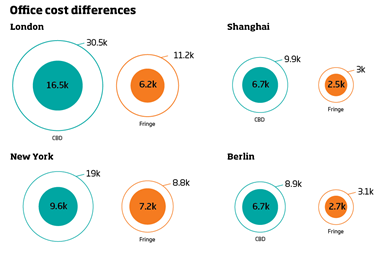As the demand for commercial property soars* and the supply of grade ‘A’ office space shrinks, there are fewer and fewer options left on the table for agents to offer corporate clients that often do not know what their property requirements will be in the future.

Serviced offices are growing in popularity for smaller businesses that want the flexibility and reassurance of known costs over a shorter term, but for larger clients seduced by the concept of an opex property model it can often simply be an expensive, quick-fix solution.
At board level, organisations are now beginning to recognise that the type of property they choose can be intrinsically linked to their commercial success, whether that is measured in employee productivity, profits or both. In turn, this has resulted in the C-suite getting more involved in property decisions. Not only do they want space in the right location and with the right design that will inspire and retain staff, but they also want room for manoeuvre, so they can potentially scale up and down, dependent on market conditions, and also support trends such as flexible working so that space can accommodate anything from 50% to 90% staff turnout.
The innate flexibility of a property is increasingly rising to the top of the wish list. Meeting this criteria can be problematic, because serviced offices often have a price premium and are not tailored to requirements, and traditional capital purchases or leases are too rigid with the potential to become a liability on the corporate balance sheet further down the road.
However, there is an alternative that agents should consider that bridges the ‘mid-term gap’ in the market, and one that the likes of Sky and E.ON have already embraced. The managed office solutions (MOS) approach encompasses a customised property fit-out and support for the facility with a complete service package (e.g. IT/FM), removes an occupier’s need for upfront capital expenditure and is delivered for a monthly operational cost. Aimed at larger organisations that need 10,000 sq ft or more, MOS can be applied to any building or location and can be tailored to the specific needs of an organisation. With a depletion in office stock, especially in urban areas, the MOS approach can also be used to renovate unused property and allows agents to dispose of surplus property from their existing portfolios.
Where MOS really wins, though, is within industries where change is expected, for example organisations with contact centre operations that are often subjected to ramp-up and ramp-down periods. By presenting costs with no dilapidations or exit fees over an agreed contract term, MOS can enable budgetary forecasting and also give the occupier the freedom to alter their capacity from, say, 150 to 500 workstations, over, say, a three-year term. Similarly, the model can be adopted for organisations that need an interim office solution or space based on a new project or market opportunity. In particular, overseas companies wanting to set up in the UK are ideal candidates for MOS because they are essentially testing the water; they typically do not have their own property team in the UK; and they will be looking for a consultant that can find the right property with the minimum risk.
In circumstances where serviced offices are too risky or costly, capital is scarce or leases are rejected by occupiers for being too long, agents, by recommending MOS, have the opportunity to differentiate themselves from the competition and facilitate a deal that is mutually beneficial for all parties. Occupiers have a cost-effective property that is fluid enough to stay in tune with their overall business strategy, while agents can maximise client satisfaction, cement long-term relationships and secure themselves recurring fees for months or years to come.
*Office take-up in city centres across nine major UK cities during the second quarter of 2015 rose by almost 50 per cent ahead of the five-year quarterly average, according to a review of the regional office occupier markets by GVA
John Gotley is managing director at Portal Group





























No comments yet